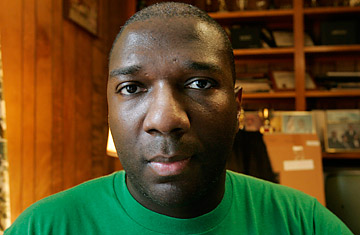
Alvin Greene, South Carolina Democratic candidate for U.S. Senate
(2 of 2)
In trying to explain the unexpected, Ludwig and Rawl have settled on suspicion. They know what they did to win the primary — Rawl even threw out the first pitch at a minor league game in Myrtle Beach. And they know that Greene never really left his living room. So they have begun to build a case that the state's voting machines — electronic boxes without a paper trail — may be at fault. They have been collecting anecdotal reports of machine malfunction and casing academia for analyses of the results that suggest statistical improbability. Elsewhere in the state, Democratic and Republican consultants have, without evidence, alleged dirty tricks, pointing to the sordid 1990 incident when Republicans urged a black man onto the ticket to boost white turnout.
A third explanation now seems the most likely: Greene got lucky. His name appeared first on the ballot and may have had a more dulcet-sounding tone to it, and there is little evidence that anyone knew much about either candidate before the election. In one poll a few weeks before the election, only 4% of state Democrats had a favorable opinion of Rawl, in part because so few knew who he was."I talked to a lot of people, and a lot of people voted for him," Democratic state representative Todd Rutherford told MSNBC. "They can't tell me why. They just said that hey, they saw the name and they pushed the button."
Greene says he paid the $10,400 filing fee with his Army savings and that he never had professional help from outside. He wants to get on with building a campaign, based around three issues: jobs, education and "justice in the judicial system." But there are signs that he has no idea how to proceed. He says he is still waiting for the state party to provide him with the money and infrastructure to launch a campaign, but the state chair, Carol Fowler, says she will not back someone who is facing charges "for something truly distasteful." When first asked if he would grant an interview with TIME, Greene responded by asking a question of his own: "Does the candidate get paid?"
Throughout all the phone calls, Greene keeps trying to refocus the conversation on what he feels is important, his message and his plans for an hour-long televised debate with Republican incumbent Jim DeMint in September. He has plans, he says, for more funding to widen roads and create jobs, more money to train teachers and reforms that would curtail long jail sentences for first-time, nonviolent crimes. He is back on message again, doing what he has always wanted to do, if maybe not exactly quite like this. "My campaign slogan," he says, "is 'Let's Get South Carolina Back to Work."
There is a way in which Greene is living out both a nightmare and a lifelong dream at the same time. He claims to have always been a political junkie, having graduated the University of South Carolina with a degree in political science, voting for Obama twice by absentee ballot and even donating to the President's campaign. "I can really think back to Jesse Jackson's 1988 run for President," he says, mentioning the year his mother died, when he was just 10. "I made a campaign sign out of construction paper. It was a blue sheet of construction paper, and I just cut out red and white letters."
Signmaking is a skill Alvin Greene may need in the weeks ahead.
